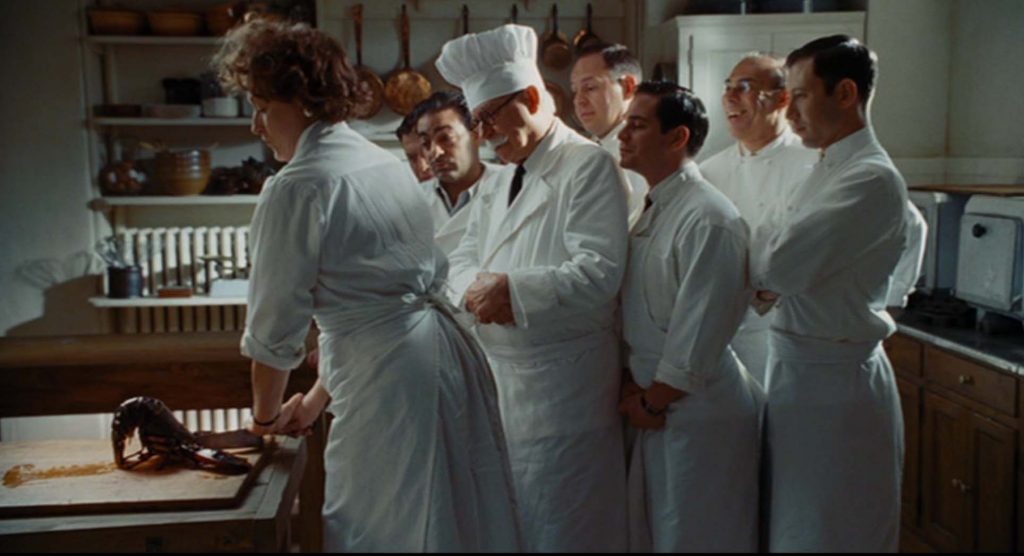
Film Matters: Please tell us about your article that is being published in Film Matters.
Florian Zitzelsberger: The article focuses on aspects of domesticity and gender in the film Julie & Julia by director Nora Ephron. I have loved this film ever since its release in 2009, mainly because I am a huge fan of Julia Child’s work and was very happy to see her come to life again on the big screen. Her enthusiasm for cooking became a huge inspiration for people all around the globe, women in particular. I therefore ask in my article: how does the film engage with women? One of the most intriguing aspects, for me, lies in the ways in which the film plays with “traditional” views on gender because Julia Child surely was a woman who knew how to cook—which, however, didn’t reduce her to the status of an exclusively domestic women.
FM: What research and/or methodologies do you incorporate in your article?
FZ: I mostly look at the visual representation of gender ideals associated with the cult of true womanhood and the self-made man: how are women in Julie & Julia framed? My reading is informed by gender studies and therefore also focuses on the performativity of the moving image: how does film reiterate societal gender norms?
FM: Describe the original context for/when writing this article while an undergraduate student.
FZ: I first wrote on Julie & Julia in a seminar on foundational American myths. One topic we discussed quite excessively was the myth of self-making which, in the American imaginary, is coded as male. This, of course, made me think and I then decided to turn this concept on its head and write about self-made women. Writing my term-paper, however, I noticed that it’s not that easy: Although films like Julie & Julia make great efforts to frame women positively (which the film successfully does), the visual idealization of domesticity has to be taken with a grain of salt because it runs the risk of affirming toxic notions of femininity that counteract the (feminist) ambitions of the film.
FM: How has your department and/or institution supported your work in film and media?
FZ: The English and American Studies division at the University of Passau, Germany, is generally really open-minded. Even though the focus of my studies is on literature, I was able to take a lot of cultural studies classes where film analysis was always wholeheartedly invited. My supervisors (for this article as well as other papers and my final thesis) always showed great interest in working with students on individual papers; in the end, the most valuable discussions took place before or after class. We surely share the same passion for film, TV, and other media.
FM: How has your faculty mentor fostered your advancement as a film scholar?
FZ: My mentor continuously reminded me that, even though my studies focus more on literary and cultural studies than film studies, I can always use the synergies between these fields. This approach really speaks to me on a personal level as well as an academic one: I feel like people usually waste a lot of time thinking about their differences when it’s more sensible to look at what we share. In terms of film studies, I highly value my background in literary and cultural studies as it broadens my view on film and, in the end, helps me better my understanding of how film works in the context of society.
FM: How has the Film Matters editorial and publication process impacted the development/evolution of your article?
FZ: The feedback provided for my article really helped sharpen the focus when needed. I also really appreciated the collegial nature of our cooperation.
FM: What audience do you hope to reach with your Film Matters article and/or what impact do you hope it has on the field of film studies?
FZ: I wish for my piece to be read by people interested in gender, especially gender in the context of American cultural history. As my analysis of Julie & Julia demonstrates, films reflect on (historical) imaginations of femininity and masculinity—sometimes more successfully, sometimes less. The issue I am addressing shows that film can also be deceiving and is not always as pretty/tasty as its visuals lead one to assume. Visual idealization has to be met with a critical lens which I hope to have achieved in my article.
FM: What are your future plans?
FZ: I am currently working on my final thesis where I analyze how the American film musical self-reflexively engages with aspects of its genre, narratorial mode(s), and representational nature. My thesis is informed by queer narratology and makes use of frameworks usually associated with the study of literature to broaden the scope of my analyses of film. After that, I’d like to pursue a PhD in American Studies.
Author Biography
Florian Zitzelsberger has recently finished his studies in English and German (teacher training for secondary education) at the University of Passau, Germany, where he currently works as a researcher in American studies and teaches literary and media studies. His research is prompted by an interest in American popular and queer culture and focuses on self-reflexivity and metareference across media, digital communication, ecocriticism, the American film musical, and queer theory. He has published articles on contemporary film, covering hybridity in queer cinema, representations of gender and motherhood as well as theatrical remediation, alienation, and self-reflexivity (most prominently in the genre of the musical), which have, among others, appeared in Humanities and the Iowa Journal of Cultural Studies. Other publications include essays on YouTube and environmentalist metafiction. His most recent work is centered on queer narratology and examines the intersections between metareference and queer signification, which constitutes the primary focus of his PhD project.




































